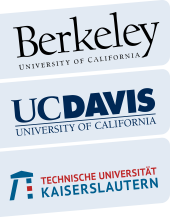

RESEARCH PROGRAM
Title: Modeling and simulation of thermophysical properties of fluids at extreme conditions based on molecular thermodynamics
Name: Jens Staubach
E-Mail: Jens.Staubach@mv.uni-kl.de
Phone: +49 631 – 205 - 2761
Project description:
Starting situation
For machining processes, such as drilling and grinding, working fluids play a crucial role. For adequately modelling these types of processes, thermophysical property data of working fluids are a prerequisite. In the contact zone, extreme conditions prevail, e.g. regarding temperature and pressure. Experiments at such conditions are often not feasible. Models based on molecular thermodynamics can, however, be favorably used for predicting thermophysical properties. In particular, the strong physical background of these models often allows successful extrapolations to conditions that were not considered for the model development such as extreme pressure and temperature. Both molecular dynamics (MD) simulations and molecular-based equations of state EOS are attractive candidates for such applications. However, the detailed aspects of the extrapolation behavior of these models as well as their applicability in multi-scale modelling has not been assessed yet.
Approach
In this project, the behavior of the two model types upon extrapolation will be studied in a complementary approach. Therefore, thermodynamic limits, such as Brown’s characteristic curves, will be used. Model fluids will be used as a starting point. Then, also real substance models will be considered. MD simulations are relatively computationally expensive, but on the other hand the gold standard for extrapolation. Therefore, the much more inexpensive (but less reliable) molecular-based EOS will be systematically compared to the predictions from MD. A suitable EOS model will be selected. In a second step, we will apply this model directly in mesoscopic and macroscopic modelling. This will be done by developing an API (application programming interface) that can be used to connect our equation of state software package to other software tools such as computational fluids dynamics (CFD) simulation engines. This approach will be tested for the modelling of a simple machining processes.
Expected Results
The project will provide new insights on the extrapolation behavior of different molecular thermodynamics models. This will facilitate the selection of a suitable models for different applications. Moreover, the project will explore how molecular-based EOS can be interconnected to CFD simulations. Overall, this work will contribute to a better understanding of the advantages and drawbacks of molecular-based EOS as well as MD simulations regarding their applicability under in extreme conditions and in other simulation tools.

